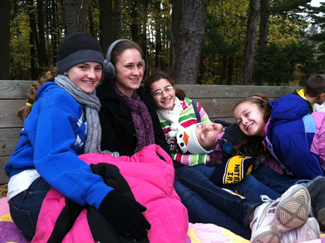I was invited to talk to a mother’s group last week and the subject of brother and sister relationships came up. How do you get your children to get along? What do you do about building sibling bonds?
Well….
No family is perfect. We all try, and sometimes fail and then simply get up and try again, but truth be told there are ways to foster great relationships between our children and their siblings. Here are a few ideas:
First, recognize that selfishness is the result of the fallen nature of man. And many sibling squabbles and rivalry comes from selfishness. That selfishness is a tendency does not mean it is acceptable, but recognizing the root will help eliminate it. The primary way to build sibling bonds, then, is to lead a rich sacramental life as a family- frequent confession and Mass- and to have parents authentically loving one another and demonstrating patience and unselfishness.
Second, experts often tell us that siblings will seek out conflict to gain the attention of parents. Pre-empt this by making sure you are fully present for your children every day. Limit YOUR time on the computer, phone and watching television. Look into your children’s eyes when they speak and really listen. Children who feel they have the attention of their parents are less likely to misbehave, tattle, or fight with their siblings.
Third, implement some family-building strategies. These are in no particular order:
Find ways for siblings to work together.
This may be setting the dinner table when they are very small or in joint meal planning and preparing when they are older. Solving problems together is a team building activity, so anything that involves working together toward a common goal can help. Cleaning the garage and making jigsaw puzzles together both can help improve relationships.
Give them time apart.
Everyone needs some personal space, to allow positive interaction with others. Let your children have some space and time alone to think, pray, read, or do nothing. This will help recharge them mentally, physically and spiritually and help allow them to be their best selves when they interact socially.
Foster respect.
Help your children respect others’ personal spaces by reminding them to knock before entering their sibling’s room, to not touch personal and private belongings of their brothers and sisters, and to respect the opinions of their siblings. Do not allow interruption or demeaning or sarcastic remarks. Begin young. Teach by example. Encourage encouragement in your home.
Manage your children’s outside activities and teach service.
It is difficult for children to learn unselfishness if they are immersed continually only in activities that benefit them. While certainly it is our responsibility as parents to help our children develop their gifts and talents, we must balance that with opportunities for genuine service. If we can afford music or dance lessons, or participation on a baseball or swim team or the like, those can be wonderful ways to help children develop teamwork and skill. But even families with the best intentions can become slaves to those activities so these activities must be balanced with service to others.
How can families help their children learn to serve? They can learn simply by their parents providing opportunities for them to do so. Children can help watch younger cousins at grandma’s house, giving a frazzled aunt a few minutes break. They can participate in a Life Chain or accompany Dad to the soup kitchen when he volunteers. Children learn to walk by walking. They learn to talk by talking. And children learn to serve by serving. There really is no other way.
Public places are not the only venues in which to serve. Opportunities also abound in the home. An older sister can help a younger one wash up, brush her teeth and get in to her pajamas, read her a few books before mom and dad come up to pray with them. A teenaged brother can throw the football with his younger sibling, offering tips and learning patience in the process. This will help build a sibling bond.
Build memories.
Something you do the same way over time, will become a tradition and can create treasured memories. Saying nightly prayers together, having short weekly family ‘meetings’ over Sunday dinner or instituting an occasional family ‘poetry reading night’ or family backyard game of baseball or croquet are all ways to cultivate family time and encourage bonding. Family trips do this too- and even mishaps can become treasured memories. If finances don’t allow for a week’s family vacation, try a day trip up to Lake Michigan or other county park. Bring picnic baskets for lunch and Frisbees for entertainment. Now that the weather is shifting you might rent skates and plan an ice skating outing. Note: Definitely ‘forget’ to bring the cell phones.
Consider your children’s friends.
Are they a help or hindrance in sibling bonding? If an honest assessment reveals your children are too peer dependent, think of ways to gently pull them back to the family unit.
Engage your children in birthday planning for their sibs.
Long ago (maybe 15 years?) our family instituted the birthday quiz tradition. One of the siblings of the birthday person creates a quiz about that person. (Favorite movie, best memory, which vacation would he/she choose, etc.) This quiz is given on the birthday and of course the answer key is the birthday person’s answers. We have great fun with this! Little children love to be a part of planning surprises, so let them help make family birthdays special. Make rhyming clues around the house, ending in one birthday present. Flip through baking books with your girls and ask them to help you find a perfect cake design for their sister. When these types of activities are implemented over time, the benefit is building thoughtfulness and sibling bonds.
* * * * *
Also, consider your own attitude toward YOUR siblings. Model what you hope to see in your family some day. Pray that God will bless your children’s relationships with one another. Resist the urge to interfere every time they squabble. Give them a chance to work out their differences. Unless a major offense or injustice has occurred, just let them be.
Personally, I love seeing my 17 year old daughter, who aims for a career in animation, ask her seven year old sister if she wants to draw with her or to hear that my adult son who lives in Atlanta is planning a trip to Los Angeles to visit his brother, just for fun. Sometimes, I will overhear a conversation between two sisters, one encouraging another or giving advice about how to handle a delicate situation with another person. And it is wonderful when I peek outside while making dinner on a cold autumn Saturday afternoon and spot four sisters sitting on the back swing, laughing and talking together.
I’m sure you’ve experienced moments like these in your own families. They really warm a parent’s heart. With a little planning and effort all of us can help encourage strong sibling relationships in our families. They will, after all, continue to bless our children long after we are gone.
Theresa Thomas is the co-author Stories for the Homeschool Heart (Bezalel Books, 2010 & winner of About.com Best Catholic Book of 2010), family columnist at Today’s Catholic News and a contributing writer for the Integrated Catholic Life™.
Please help us in our mission to assist readers to integrate their Catholic faith, family and work. Tell your family and friends about this article using both the Share and the Recommend buttons below and via email. We value your comments and encourage you to leave your thoughts below. Thank you! – The Editors













